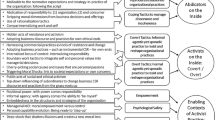Abstract
Corporate Social Responsibility, CSR, is as prominent a core element in organizations’ performance today as is ethical behavior from each internal stakeholder. This chapter describes CSR as an essential manifestation of mindful leadership and of moral sensitivity. Mindfulness is a critical skill for any leader, in any setting, because it has a major influence on the type of decisions this leader will make. As a core element of mindfulness, this chapter also discusses respect, as this presents itself through the way we treat people and other living beings. The chapter then explains the importance of ethics in business performance, and links this to CSR. It also mentions ISO 26000 as a crucial morally responsible effort in business ethics. In order to bring the message on CSR home, the chapter further elaborates on the concept of stakeholders, clarifying the breadth of consideration needed in considering this concept. As an illustration of the interrelatedness between mindful leadership, moral behavior, and CSR, the chapter presents the case of Interface and its founding CEO, Ray Anderson.
Access this chapter
Tax calculation will be finalised at checkout
Purchases are for personal use only
Similar content being viewed by others
References
Anderson, R. (2007). Doing well by doing good. In D. Church (Ed.), Einstein’s business: Engaging soul, imagination, and excellence in the workplace. Santa Rosa, CA: Elite Books.
Arikan, E., Kantur, D., Maden, C., & Telci, E. E. (2016). Investigating the mediating role of corporate reputation on the relationship between corporate social responsibility and multiple stakeholder outcomes. Quality and Quantity, 50(1), 129–149.
Benedek, A., Takács, I., & Takács-György, K. (2014). Examining corporate social responsibility from a stakeholder viewpoint based on an empirical research. Zarzadzanie Publiczne, 27, 309–319.
Carson, S., & Langer, E. (2004). Mindful practice for clinicians and patients. In L. Haas (Ed.), Handbook of primary care psychology (pp. 173–186). London: Oxford.
Carson, S. H., & Langer, E. J. (2006). Mindfulness and self-acceptance. Journal of Rational-Emotive & Cognitive-Behavior Therapy, 24(1), 29–43.
Davis, M. (2014, September 3). Radical industrialists: 20 Years later, Interface looks back on Ray Anderson’s legacy. Greenbiz.com. Retrieved February 15, 2016, from http://www.greenbiz.com/blog/2014/09/03/20-years-later-interface-looks-back-ray-andersons-legacy
de Mascena, K., Cunha, M., Fischmann, A. A., & Boaventura, J. M. G. (2018). Stakeholder prioritization in brazilian companies disclosing GRI reports. Brazilian Business Review, 15(1), 17–32.
Ditlev-Simonsen, C., & Wenstøp, F. (2013). How stakeholders view stakeholders as CSR motivators. Social Responsibility Journal, 9(1), 137–147.
European Commission. (2001). Promoting a European framework for corporate social responsibility (Green Paper). Luxembourg: Office for Official Publications of the European Commission.
Freeman, R. E. (1984). Strategic management: A stakeholder approach. Boston, MA: Pittman.
Golob, U., & Bartlett, J. (2007). Communicating about corporate social responsibility: A comparative study of CSR reporting in Australia and Slovenia. Public Relations Review, 33(1), 1–9.
Hahn, R., & Kuhnen, M. (2013). Determinants of sustainability reporting: A review of results, trends, theory, and opportunities in an expanding field of research. Journal of Cleaner Production, 59, 5–21.
Interface’s Ray Anderson receives honorary doctorate for sustainability initiatives. (2011, August 11). Professional Services Close – Up.
ISO 26000: International Organization for Standardization. (2010). Guidance for social responsibility. Geneva: Author.
Kabat-Zinn, J. (2005). Coming to our senses. New York, NY: Hyperion.
Khong, B. (2011). Mindfulness: A way of cultivating deep respect for emotions. Mindfulness, 2(1), 27–32.
Langer, E. (1989). Mindfulness. Reading, MA: Addison-Wesley.
Langer, E. (2011, August 10). Ray Anderson, ‘greenest CEO in America,’ dies at 77. The Washington Post Obituaries. Retrieved February 15, 2016, from http://www.washingtonpost.com/local/obituaries/ray-anderson-greenest-ceo-in-america-dies-at-77/2011/08/10/gIQAGoTU7I_story.html
Marques, J. (2012a). A global SR standard: Good, or too good to be true? The Journal for Quality and Participation, 34(4), 29–33.
Marques, J. (2012b). Ethics: Walking the talk. The Journal for Quality and Participation, 35(2), 4–7.
Marques, J. (2016). Leadership and mindfulness. In J. Marques & S. Dhiman (Eds.), Leadership today: Practices for personal and professional performance. New York, NY: Springer.
Pérez, A., López, C., & García-De los Salmones, M. d. M. (2017). An empirical exploration of the link between reporting to corporate social responsibility reputation in the spanish context. Accounting, Auditing & Accountability Journal, 30(3), 668–698.
Sones, M., Grantham, S., & Vieira, E. T. (2009). Communicating CSR via pharmaceutical company web sites: Evaluating message frameworks for external and internal stakeholders. Corporate Communications, 14(2), 144–157.
Taghian, M., D’Souza, C., & Polonsky, M. (2015). A stakeholder approach to corporate social responsibility, reputation and business performance. Social Responsibility Journal, 11(2), 340–363.
Wang, H., Tong, L., Takeuchi, R., & George, G. (2016). Corporate social responsibility: An overview and new research directions. Academy of Management Journal, 59(2), 534–544.
Weismann, M. F. (2017). The missing metrics of sustainability: Just how beneficial are benefit corporations? Delaware Journal of Corporate Law, 42(1), 1–50.
Weiss, J. W. (2009). Business ethics: A stakeholder & issues management approach (5th ed.). Mason, OH: South-Western Cengage Learning.
Zizka, L. (2017). The (mis)use of social media to communicate CSR in hospitality. Journal of Hospitality and Tourism Technology, 8(1), 73–86.
Author information
Authors and Affiliations
Corresponding author
Editor information
Editors and Affiliations
Rights and permissions
Copyright information
© 2020 Springer Nature Switzerland AG
About this chapter
Cite this chapter
Marques, J. (2020). Making and Keeping Stakeholders Mindful of CSR. In: Marques, J., Dhiman, S. (eds) Social Entrepreneurship and Corporate Social Responsibility. Management for Professionals. Springer, Cham. https://doi.org/10.1007/978-3-030-39676-3_14
Download citation
DOI: https://doi.org/10.1007/978-3-030-39676-3_14
Published:
Publisher Name: Springer, Cham
Print ISBN: 978-3-030-39675-6
Online ISBN: 978-3-030-39676-3
eBook Packages: Religion and PhilosophyPhilosophy and Religion (R0)




